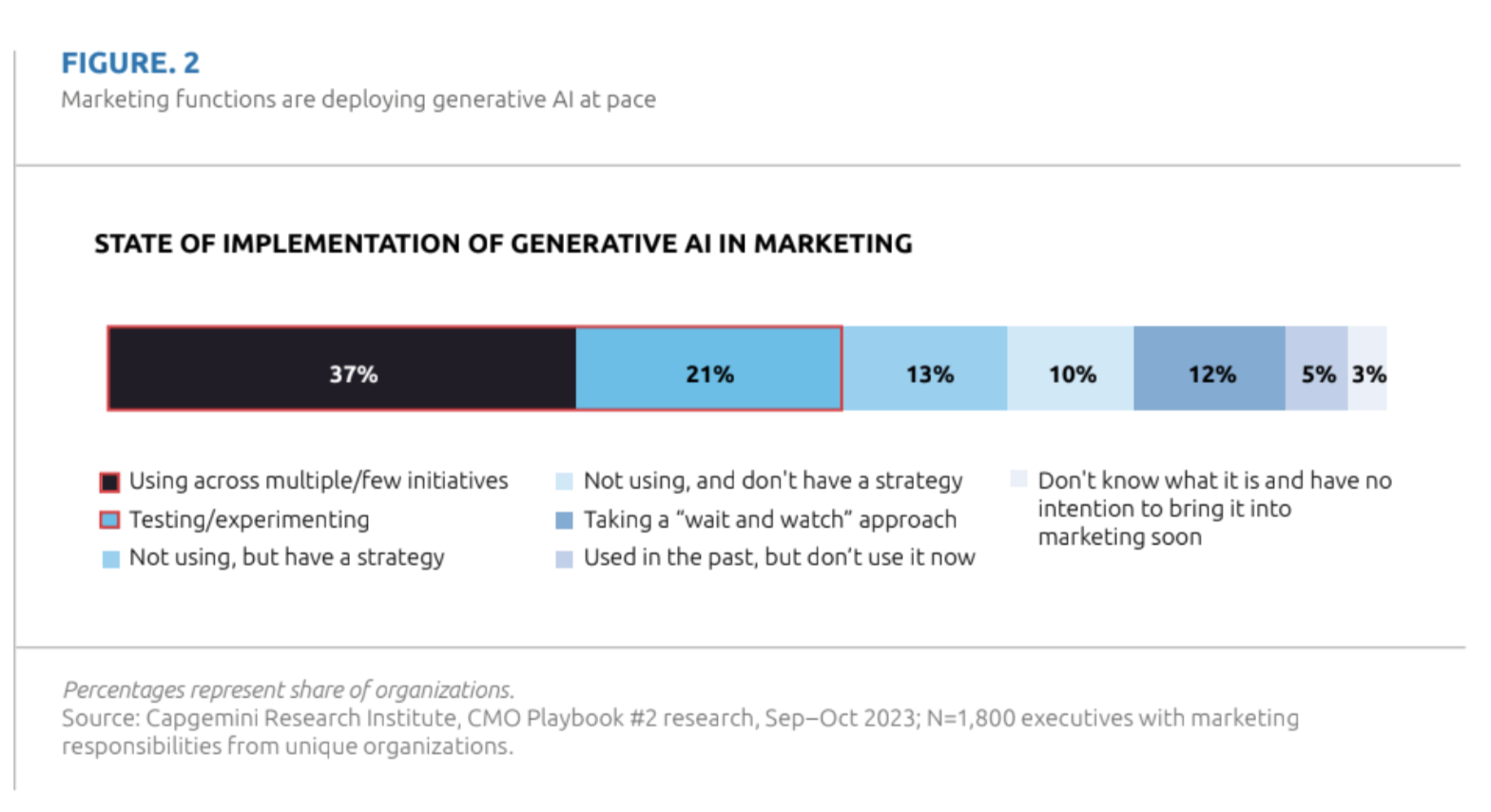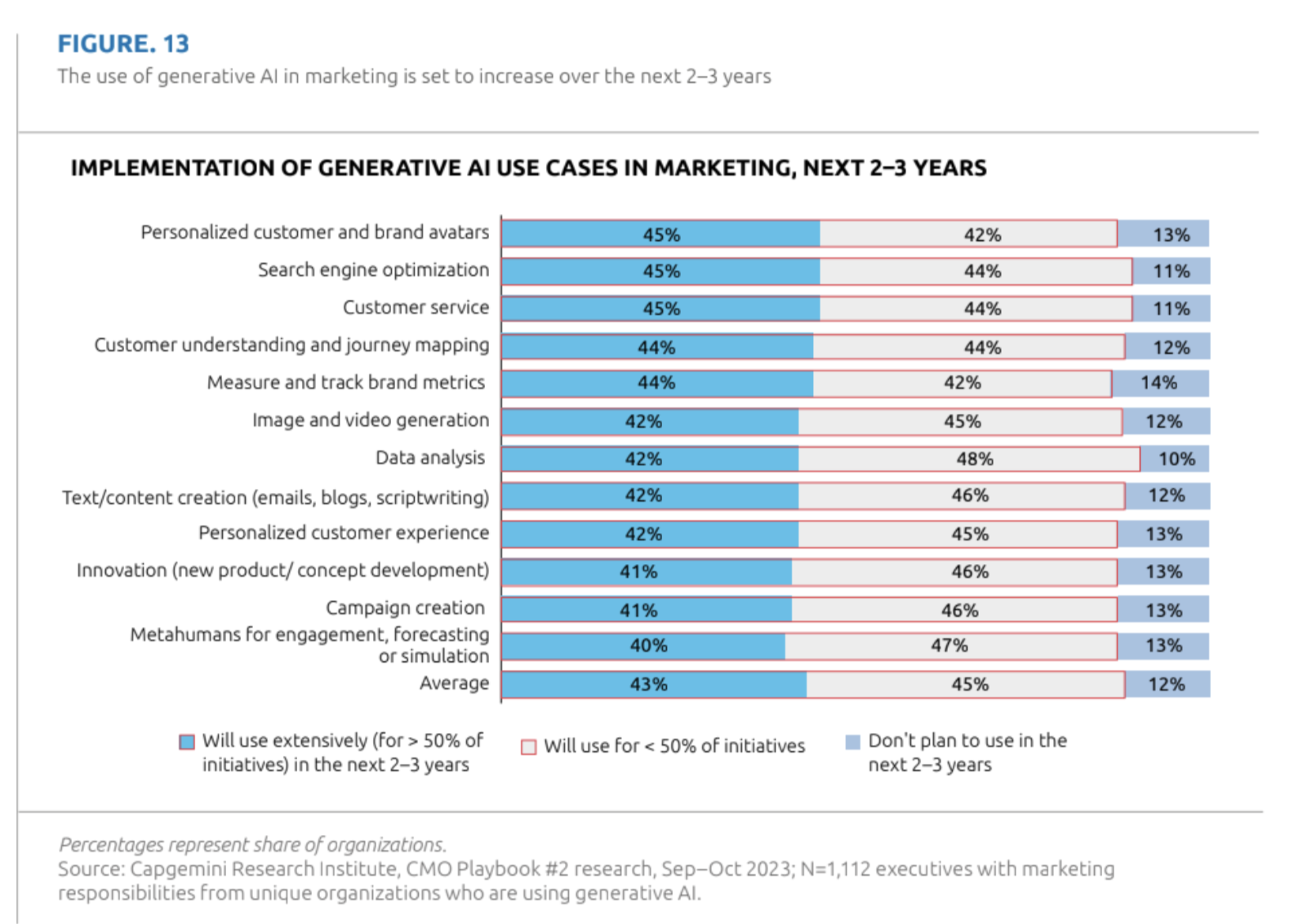Maximize Your Exit: How AI Will Elevate Agency Valuations
In the swiftly evolving landscape of digital marketing and business operations, the integration of Artificial Intelligence (AI) has transitioned from a competitive edge to a necessity. As reported by Capgemini, nearly 60% of organizations have already begun to weave AI into the fabric of their operations. The message for agency founders and CEOs is clear: the future is AI-driven, and the time to adapt is now.
The Urgency of AI Adoption
Capgemini Research Institute. “Generative AI and the evolving role of marketing: A CMO's PLAYBOOK”, 2023. pp. 12.
The rapid adoption of generative AI reflects its significant potential to redefine marketing strategies and business operations. AI is a valuable resource for businesses, so much so that over half of the organizations surveyed in the Capgemini study are integrating AI into their processes. This fast embrace is not merely about keeping up with technological trends but leveraging AI to unlock innovative solutions that offer a competitive advantage, enhance customer engagement, and enable personalized marketing efforts.
Transformative Use Cases of AI
AI's impact spans various facets of business by driving growth and efficiency while making significant strides in how companies approach their bottom line.
Capgemini Research Institute. “Generative AI and the evolving role of marketing: A CMO's PLAYBOOK”, 2023. pp. 24.
Optimizing Talent Acquisition: AI has revolutionized recruitment by automating time-consuming tasks such as sourcing, screening, and interviewing. This automation speeds up the hiring process and enhances the quality of hires, contributing to a more efficient workforce and reducing recruitment costs by up to 20%.
Democratizing Data and Insights: AI technologies, especially in data analysis and management, allow non-technical users to access and understand complex data easily. This democratization of data empowers all levels of an organization to make informed decisions, fostering a culture of innovation and efficiency.
Enhancing Sales and Marketing: From hyper-personalization of customer content to optimizing social media strategies and improving SEO, AI can significantly elevate sales and marketing efforts. AI-driven chatbots and sentiment analysis enhance customer interaction and brand perception, leading to better conversion rates and customer retention. The Harvard Business Review shares that companies that use “AI and automation could drive better business results and give marketers an edge over their competition.”
AI's Potential Impact on Business Valuations
Capgemini Research Institute. “Generative AI and the evolving role of marketing: A CMO's PLAYBOOK”, 2023. pp. 25.
Improved Top Line Revenue
AI-Empowered Revenue Growth: By implementing AI in sales and marketing efforts, businesses can leverage predictive analytics to identify potential sales opportunities and optimize marketing campaigns. This leads to a more targeted approach, increasing conversion rates and customer lifetime value.
Additionally, more time spent on high-value activities tied to new revenue generation versus low-value, repetitive activities creates the opportunity to increase revenue per employee.
For example, let’s say an advertising agency generates $20M in annual revenue. Let’s also say that adopting AI across sales and marketing activities and re-prioritizing the activities for revenue-generating headcount could drive an additional 10% in revenue annually. If the business initially generated $20M in revenue, a 10% increase equates to an additional $2M in revenue, bringing the total to $22M.
Improved EBITDA Margins
Operational Efficiencies and Cost Savings: AI contributes to improved EBITDA margins through operational efficiencies, such as automating routine tasks and enhancing decision-making processes. This reduces operational costs and improves productivity, allowing the business to achieve a higher profit margin. For the example agency, if AI improves the EBITDA margin from 10% to 15% on the original $20M revenue, this adjustment results in an EBITDA increase from $2M to $3M.
AI-Enhanced Products and Services: AI can also add value to the products or services offered by a business, enabling premium pricing strategies or opening new revenue streams, further contributing to top-line growth and profitability.
The Valuation Uplift
With the original valuation based on a 5-7X EBITDA multiple, the business's valuation ranged from $10M to $14M. After implementing AI, with the EBITDA potentially increasing to $3.3M ($2.2M from growth plus efficiency gains), the valuation could escalate to between $16.5M and $23.1M. This represents a significant uplift in business value, illustrating the profound impact AI can have not just on operational efficiency and revenue growth but also on the market valuation of a business.
For shareholders, this valuation uplift directly translates into a more lucrative exit. The strategic integration of AI into business operations not only enhances current profitability but also significantly increases the attractiveness of the business to potential buyers or investors, often leading to better exit terms and higher returns for the founder.
For agency founders and CEOs, the integration of AI is not a question of if but when. The current landscape presents a compelling case for the urgent adoption of AI to remain competitive and significantly enhance business valuation. By embracing AI, leaders can ensure their agencies are well-positioned for success in the digital economy and leverage AI's capabilities to drive growth, efficiency, and innovation across all aspects of their company’s operations.



